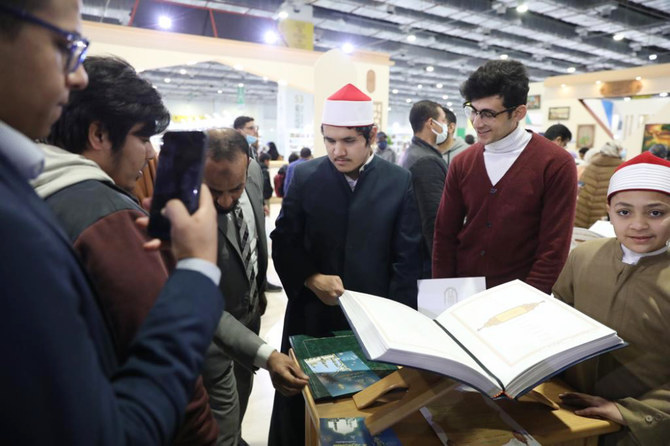CAIRO: An experimental copy of the Qur’an written in Braille for the blind was recently displayed by Al-Azhar Al-Sharif at its stand at the 53rd Cairo International Book Fair, which ended on Monday, Feb. 7.
Al-Azhar Press, under the guidance and patronage of the Grand Imam Dr. Ahmed Al-Tayeb, Sheikh of Al-Azhar Al-Sharif, took on the project of printing the Qur’an in Braille using the latest printing systems.
Al-Azhar said in a statement that this trial version of the Qur’an featured the written words of the Qur’an alongside prominent Braille letters to achieve societal cooperation between the sighted and the blind in memorising and reading the Qur’an.
According to the statement, this step was taken by Al-Azhar due to its belief in taking care of people with disabilities including the blind, and as an extension of Al-Azhar’s mission in spreading the Qur’an and its sciences.
The experimental version that Al-Azhar displayed in the exhibition is characterised by its large size and special thick cardboard, where the dots are clear and prominent so that they can be easily read using the fingertips.
Braille is a method of reading and writing used by the blind and visually impaired. It was named after its French inventor, Louis Braille, who lost his sight at the age of three. Louis found that using the dots system to read and write was easier and faster than the previous method of using prominent printed letters.
Production manager at Al-Azhar Press, Hossam El-Din Mounir, told Arab News that the idea of implementing the Qur’an in Braille came from a desire to help the blind. “We designed a trial version to gauge people’s opinions first, and then we will start in its final implementation,” he said.
Dr. Eman Karim, general supervisor of the National Council for Persons with Disabilities, thanked Al-Azhar in her statements to Arab News for making the Qur’an available in Braille for people with visual disabilities, who represented 5 percent of the Egyptian community, according to the 2015 census.
She said that Al-Azhar’s adoption of the project was a serious step by a long-standing institution that believes in the effective role of this group in Egyptian society, and as an extension of its mission to spread the Qur’an and its sciences to all members of society.
Karim called on state education authorities to follow the example of Al-Azhar Al-Sharif by making cultural publications available to people with disabilities, contributing to raising awareness, especially the process of religious education to combat extremist ideas that aim to destabilize the security and stability of the country.
Akram Abed Janov, a visually impaired student at Al-Azhar from Uzbekistan, said during his visit to the Al-Azhar pavilion at the Cairo International Book Fair that he admired the idea, which provided support to blind students.
“I read from the Al-Azhar Qur’an in Braille, and I liked it very much, but what caught my attention is that the Qur’an does not have full stops at all, which may make it difficult for the blind,” Janov said. He also noticed a lack of page numbering in the Qur’an, hoping those in charge of printing copies would rectify this in the future.
















